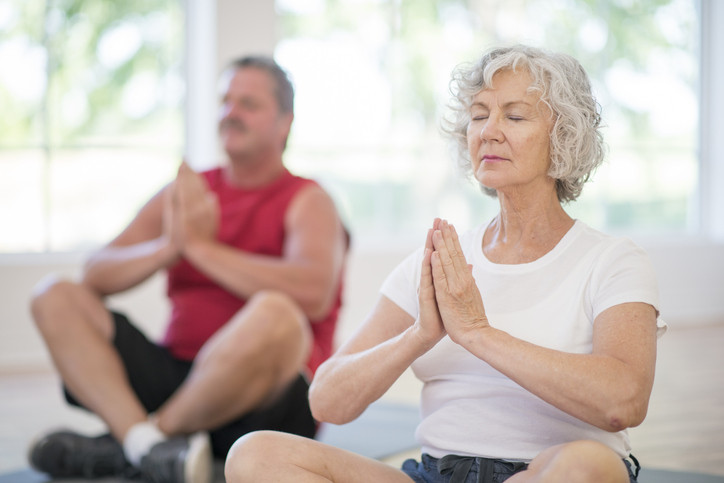Managing Stress Through Exercise And Relaxation

Managing stress through exercise and relaxation can be highly beneficial for overall well-being and mental health. By engaging in regular physical activity and incorporating relaxation techniques into your routine, you can effectively reduce stress levels and improve your mood.
These practices have been shown to enhance resilience to stress, boost self-esteem, and promote better sleep quality. Additionally, exercise releases endorphins, which are natural mood-boosting chemicals in the brain, while relaxation techniques such as deep breathing and meditation help lower heart rate and promote a sense of calm.
Incorporating both exercise and relaxation into your daily life can provide you with powerful tools to manage stress and improve your overall quality of life.

Credit: www.health.harvard.edu
The Impact Of Stress On Mental And Physical Health
Stress can have detrimental effects on both our mental and physical health. Understanding these negative impacts is crucial in managing stress effectively. Regular exercise has been shown to be an effective way to reduce stress levels. Engaging in physical activities, such as jogging or yoga, helps release endorphins, which are natural stress fighters.
Additionally, exercise promotes better sleep and boosts mood, contributing to overall well-being. On the other hand, relaxation techniques, such as meditation or deep breathing exercises, can also help manage stress. They provide a sense of calmness and can reduce anxiety and tension.
By incorporating exercise and relaxation into our routines, we can better manage stress and improve our well-being in the long run. It is important to prioritize self-care and stress management for a happier and healthier life.
Benefits Of Exercise In Managing Stress
Regular exercise is an effective way to manage stress. By engaging in physical activity, the body releases endorphins, which are natural mood boosters. Exercise also helps reduce the production of stress hormones, such as cortisol. Different types of exercises can be beneficial in relieving stress, including aerobic exercises like running or swimming.
These activities increase heart rate and improve blood circulation, promoting a sense of relaxation and calmness. Strength training exercises, such as weightlifting, can also help alleviate stress by releasing tension in the muscles. Yoga and meditation are particularly effective in reducing stress as they combine physical movement, deep breathing, and mindfulness practices.
The scientific evidence supporting exercise as a stress reliever is abundant, making it an essential part of stress management. Incorporating regular exercise into your routine can help you feel more relaxed and better equipped to deal with the challenges life throws your way.
Incorporating Relaxation Techniques Into Your Routine
Incorporating relaxation techniques into your routine can be a game changer when managing stress. Guided meditation is a powerful tool that allows you to quiet your mind and find inner peace. By focusing on your breath and clearing your thoughts, you can achieve a sense of calm and relaxation.
Another technique to explore is progressive muscle relaxation, which involves tensing and releasing different muscle groups to release tension and promote relaxation. Deep breathing exercises are also effective in relieving stress naturally. By taking slow, deep breaths and focusing on your breath, you can activate your body’s relaxation response and reduce stress levels.
Incorporating these relaxation techniques into your daily routine can help you better manage stress and improve your overall well-being.
Creating An Exercise And Relaxation Plan
Designing an effective exercise routine for stress reduction involves setting realistic goals for physical activity and scheduling time for relaxation and self-care activities. By creating a balanced plan, individuals can manage stress through exercise and relaxation. Start by determining achievable fitness targets, ensuring they align with personal capabilities.
Then, establish a schedule that includes dedicated time for relaxation and self-care activities. This combination provides an effective way to combat stress and promote overall well-being. It’s important to remember that every person is unique, so tailoring the exercise and relaxation plan to individual needs is crucial.
Whether it’s engaging in yoga, meditation, or cardio workouts, finding activities that bring joy and promote relaxation is key. By investing time in both exercise and relaxation, individuals can effectively manage stress and improve their overall quality of life.
Making Exercise And Relaxation A Lifestyle
Managing stress through exercise and relaxation is all about making these activities a part of your daily lifestyle. Overcoming barriers to consistent exercise and relaxation can be challenging, but finding motivation and staying committed are key. It’s important to incorporate physical activity and relaxation into your daily life to effectively manage stress.
This can be done by finding activities that you enjoy and make you feel good, whether it’s going for a walk, practicing yoga, or engaging in a hobby. Making exercise and relaxation a priority will not only help reduce stress but also improve your overall well-being.
So, take the time to prioritize self-care and make exercise and relaxation a regular part of your routine. Your body and mind will thank you for it.
The Role Of Diet And Sleep In Stress Management
A balanced diet plays a crucial role in reducing stress levels. Consuming nutritious foods nourishes both the body and mind. Additionally, a quality sleep pattern is vital in managing stress effectively. Getting enough rest allows the body to recover and recharge, promoting overall well-being.
To improve your diet, focus on incorporating whole foods, fruits, and vegetables while minimizing processed foods. In terms of sleep, establish a consistent bedtime routine and create a conducive sleeping environment. Moreover, limit electronic device use before bed and ensure your room is dark and quiet.
By prioritizing both diet and sleep, you can effectively manage stress and enhance your overall quality of life.
Finding Support And Accountability
A strong support system is vital for effectively managing stress. Connecting with stress management groups or classes can provide a network of individuals who understand your struggles and offer guidance. Moreover, utilizing technology can enhance accountability by tracking progress and sharing achievements with others.
Engaging with like-minded individuals can motivate and keep you on track with your stress management goals. This sense of support and accountability can play a crucial role in reducing stress levels and promoting overall well-being. So, don’t hesitate to seek out a support system and make use of technology to enhance your stress management journey.
Prioritizing Self-Care
Engage in joyful and relaxing activities that prioritize your well-being. Be mindful and show self-compassion during these moments. Remember to take care of yourself as you manage stress.
Seeking Professional Help When Needed
Seeking professional help is crucial for managing and reducing stress levels effectively. It is important to recognize when it’s necessary to reach out to a healthcare professional. This includes finding the right therapist or counselor who specializes in stress management support.
By doing so, individuals can benefit from therapy and gain a better understanding of how it can reduce stress. With the guidance of a professional, people can acquire the necessary tools and techniques to effectively manage their stress levels. Therapy offers a safe and supportive environment to explore and address the underlying causes of stress, allowing individuals to develop coping strategies and improve their overall well-being.
Seeking professional help is a proactive step towards managing stress and fostering a healthier and more balanced lifestyle.
Frequently Asked Questions For Managing Stress Through Exercise And Relaxation
How Does Exercise Help In Managing Stress?
Exercise helps in managing stress by releasing endorphins, which are natural mood boosters. It also helps in reducing stress hormones like cortisol and adrenaline. Regular exercise increases self-confidence, improves sleep, and provides a distraction from worrying thoughts, ultimately leading to a reduction in stress levels.
What Are Some Effective Relaxation Techniques To Manage Stress?
Some effective relaxation techniques to manage stress include deep breathing exercises, progressive muscle relaxation, meditation, yoga, and mindfulness. Engaging in activities like listening to calming music, taking a warm bath, or spending time in nature can also promote relaxation and alleviate stress.
How Often Should I Exercise To Reduce Stress?
To reduce stress, aim for at least 30 minutes of moderate-intensity exercise most days of the week. This could include activities like brisk walking, jogging, cycling, or dancing. However, even short bursts of physical activity throughout the day can be beneficial for stress management.
Find an exercise routine that suits your schedule and preferences.
Can Relaxation Techniques Alone Help Manage Stress?
While relaxation techniques can be effective in managing stress, it is important to note that they work best when combined with regular exercise and other healthy lifestyle habits. Adopting a holistic approach that includes exercise, relaxation techniques, proper sleep, a balanced diet, and social support can have significant benefits in managing stress and improving overall well-being.
Are There Any Specific Exercises Or Activities That Are Best For Stress Relief?
The best exercises for stress relief are the ones that you enjoy and can incorporate into your routine consistently. It could be any activity that gets your body moving – from walking, running, swimming, or cycling to dancing, yoga, or playing a sport.
Experiment with different activities and find what helps you feel relaxed and rejuvenated.
Conclusion
Overall, exercise and relaxation are powerful tools for managing stress and promoting overall well-being. By incorporating regular physical activity into our daily routines, we can reduce stress levels, enhance mood, and boost our energy levels. Whether it’s through activities like yoga, swimming, or jogging, exercise can provide a much-needed outlet for releasing tension and pent-up emotions.
Additionally, relaxation techniques such as deep breathing, meditation, and mindfulness can help calm the mind and promote a sense of inner peace. It’s important to find a balance that works for you and to prioritize self-care amidst the hectic demands of daily life.
Remember, your mental and emotional well-being are just as important as your physical health. By making exercise and relaxation a priority, you can effectively manage stress and live a happier, healthier life. So, take some time for yourself today and prioritize your self-care journey.
 Foods Rich in Antioxidants for Cell Health
Foods Rich in Antioxidants for Cell Health  Exploring the Mekong Delta: Best River Cruises to Book
Exploring the Mekong Delta: Best River Cruises to Book  Poker games and its important instruction
Poker games and its important instruction  Luxury Family Travel And Lifestyle Blog Rss Feed: Unveiling the Secrets of Deluxe Adventures
Luxury Family Travel And Lifestyle Blog Rss Feed: Unveiling the Secrets of Deluxe Adventures  Transform Your Teen’s Language Skills with Immersion Programs
Transform Your Teen’s Language Skills with Immersion Programs